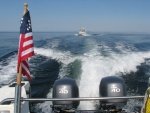colbysmith
Active member
I’d like to know what my kicker is actually burning in fuel during use. But I don’t want to run anymore wires throughout the boat. Ideally a flow unit that would mount in the kickers fuel line and read out on a gauge right there, or can wirelessly transmit it to a small gauge that can be located at the cockpit helm and is water proof. And of course it has to be sensitive to the low fuel rates used by a small kicker. I’d like it to read out amount/hr and total used and be resettable. I’ve been looking online but haven’t found anything reasonably priced to do the job. Anyone here have something they are using or know of a unit that fits the bill? Colby


